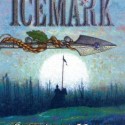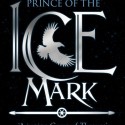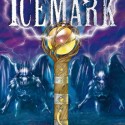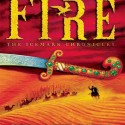An Interview with Stuart Hill
I was lucky enough to interview Stuart Hill just under a month ago. The interview has been lurking in my inbox, and I thought I’d post it now. Stuart Hill is the author of the popular Chronicles of the Icemark series. Thanks to Stuart Hill for kindly agreeing to this interview.
ThirstforFiction: What made you want to write, in particular, the Cry of the Icemark?
Stuart Hill: The Cry of the Icemark had been with me for years, and I suppose it just reached a stage where it had to be written down. But that didn’t happen until I’d finally given up all hope of ever being published and I decided to write one last novel purely for me and my own enjoyment. Fortunately the friends I showed it to convinced me to send it off to publishers, and Chicken House picked it up almost immediately.
T4F: In the Cry of the Icemark, did you purposefully want Polypontus to represent the Roman Empire and Icemark to represent the Celts/ Germanic/viking cultures, and if so, why?
SH: Yes, I wanted a large bullying empire getting some sort of come-uppance, not only because I think such a scenario is, unfortunately, still very relevant today, but also because it makes exciting reading. Added to that, I have to say that I think the peoples of our small archipeligo are truly fascinating and I wanted to depict something of their culture and history in a way that would be interesting and exciting. I think it’s pretty obvious that many of the incidents and characters are quite closely based on actual historical figures and events.
T4F: Did you find it challenging writing from the point of view of a 14 year old girl?
SH: You know, I don’t think I did particularly. People are people first and gender second, I think. Besides, my partner, Clare, read the first drafts, and remembering her own adolescent years, she said it was pretty accurate (she was a stroppy teenage Goth). Also both of my editors are women, and they immediately pointed out any unlikely behaviour and attitudes.
T4F: We know that Thirrin is a tribute to your sister, but are there any other characters that represent people you know/knew?
SH: Not people I know personally, but I did draw on some of my favourite actors to provide the bedrock of characterisation. For example Scipio Bellorum is based heavily on Jeremy Irons, in his best “clipped English baddy mode”. And Grishmak the werewolf king is Brian Blessed.
T4F: Are you planning on writing any other books? Perhaps even revisiting the Icemark?
SH: I’d love to write a prequel to Cry of the Icemark, showing how King Redrought came to power. I’ve actually written a few pages of it, but I’m not sure how commercial it’d be. But at the moment I’m working on a novel about post-Roman Britain and the struggle between the indigenous Celts and the invading Germanic tribes. Lots of blood and magic as usual, mixed in with as much historical fact as we know through the murk of the early medieaval period.
T4F: Has your life changed much since you have written the Chronicles of the Icemark?
SH: Not massively; there are no fast cars, swimming pools or any of the other trappings of a wealthy lifestyle. Though perhaps the most significant change has been working as a full time writer/artist rather than as a bookseller.
T4F: You’ve used some classic fantasy elements in your Icemark trilogy, but also some original ideas (like the Snow Leopards). How did you go about creating new species and races?
SH: As you rightly point out there are very few ‘original’ ideas for creatures and the like in the Icemark series. This was completely deliberate, and a total reaction to ‘monster-fatigue’ that set in after years of reading fantasy and sci-fi. I must admit I got heartily sick of reading yet another explanation/description of yet another exotic species. For me the story is all important and ‘world-building’ can get in the way. So when I wrote the Icemark series I was determined that all the creatures/monsters should be instantly recogniseable. If you think about it, even the talking snow leopards have a very fine forbear in Aslan and centuries of other talking beasts. It could be argued that I drifted from this stance in some of the later books of the series but even the highly exotic Cronus is obviously only the devil in a very thin disguise.





